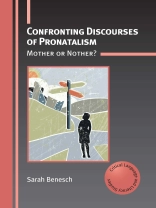This book addresses a topic that until recently had been underexplored: women who voluntarily forgo having and raising children. Grounded in a discourse approach, it examines reproductive decision-making in the context of pronatalist discourses, such as ‘biological clock’ and ‘having it all’, that encourage procreation in some while discouraging it in others. To contextualize pronatalism sociohistorically, the book also examines the relationship between pro- and anti-natalist discourses that emerged during the 20th century eugenics movement in the United States, especially its promotion of procreation by white middle-class women while discouraging poor immigrant women and women of color from reproducing. Other topics include online communities devoted to childfreedom, 20th and 21st century women authors who wrote about their decision not to procreate, responses of academic women in the field of applied linguistics to questions about their childlessness, and a personal narrative of the author’s childlessness. The author calls for solidarity between mothers and ‘nothers’ (her term for childless women) to defy the policing of women’s bodies worldwide.
สารบัญ
Chapter 1. Introduction
Chapter 2. Eugenics: Relationships Between Pro- and Anti-Natalist Discourses
Chapter 3. Mothering Discourses and Counterdiscourses in Popular Culture: Biological Clock
Chapter 4. Mothering Discourses and Counterdiscourses in Popular Culture: Having it All
Chapter 5. Discourses of Nothering Online: Seeking Community or Celebrating a Lifestyle?
Chapter 6. Discourses of Notherhood: Writers Claim their Time, Space, Energy, Money, and Reproductive Rights
Chapter 7. Academic Women and Notherhood
Chapter 8. My Notherhood: Discourses and Counterdiscourses
Chapter 9. Reproductive Solidarity
เกี่ยวกับผู้แต่ง
Sarah Benesch is Professor Emerita of English, College of Staten Island, the City University of New York, USA. Over the course of her career she has worked on critical English for academic purposes, and on the relationship between emotions and power in English language teaching.












